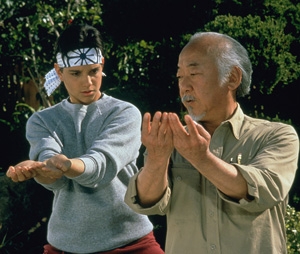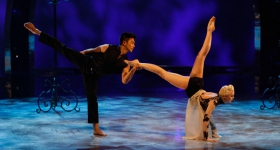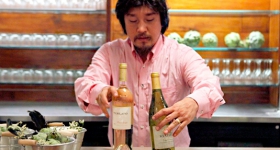Off to the oscars, 1985. The Morita family, from left: mother Yuki,
sisters Aly and Tia and Pat (Photo courtesy Aly Morita).
To know my dad, you would have to be a night owl, a boozehound, a culture junkie, an inventor, a perfectionist, a creative soul, a kid from the School of Hard Knocks, a survivor, a hard worker, a giver, a bawdy chap, a loner, a misfit, a sentimental fool or a lover of tawdry tales. Pull up a chair, order a drink and we’ll tell you a little bit about this old guy — old fart, as he would say.
You sit down, and Daddy comments on your drink order. “There was this bartender in Detroit that I met, a little Filipino guy. What’s a little Filipino guy doing in Detroit? What’s a little Jap doing sitting here with you?” He sips chardonnay, the days of vodka in his coffee in the morning “to get him going” long gone.
I welcome you with a wary but gracious smile, slightly annoyed because I‘m concerned about his alcohol consumption. These were the only times I had my dad to myself. Someone always accompanied him: During the ’80s and ’90s, there could be an assistant, publicist, bodyguard, family member, fan, leech, struggling writer, actor, director, floozy, community leader, politician or just someone who wanted my dad to do or be something he was not.
If Dad was attuned to me, he might say, “This is the only time I get with my daughter. Do you mind if we have some time together?” More often than not, I would have to welcome you and only hope you might go away. There were so many times when you did not, lingering, standing there gawking at him while we tried to resume our dinner, trying to edge into our conversation or just sitting there, being a voyeur. My father would probably send you off with a “wax on, wax off” gesture or a crane stance if he was really in a self-indulgent mood.
Before you interrupted, Daddy was talking about making it in the biz. Our conversations usually involved the struggle of the artist — more the process than “making it”.
“Daddy, I don’t know what to do with this piece,” I say, shaking my head, covering my face with my hands. “What do I do?”
“Ah. You’re not asking the magic word. It’s not the whys, whats, whens or wheres. It’s the hows! How do you do it? It’s the how you will do it that is the magic. You do what you need to do.”
I needed more than that. Although I hate to think that he talked like Mr. Miyagi, he kind of did. When he wasn’t going off on one of his longwinded, self-absorbed soliloquies, my father spoke — without the thick Japanese accent — in ambiguous certainties.
Then I would stumble, always faltering for words when I needed to speak to my parents or to people in authority. Authority: Such a strange term for assumed positions, especially for those who have failed and maybe survived, but are really just human.
Dad spent his childhood in a body cast after contracting spinal tuberculosis and lived in a charitable infirmary for poor, immigrant children at San Francisco’s Shriners Hospital. He learned to walk when he was 9.
At 11, he was escorted by an FBI agent directly from the hospital into a Japanese American internment camp. In his teens and 20s, he was a loner and a misfit within the confines of an immigrant family whose language and customs were foreign and restricting to him.
At 21, he married a woman six years older and became father to his first daughter. In his early 30s, overweight and balding, he entered 1960s show business, jabbing and jiving with lone Jewish and African American comedians, whom he felt inspired by and at home with. In his late 30s, he married my mother, his equal in conspicuously quirky Japanese American-ness; they held their wedding reception at the Playboy Club. My sister and I were born shortly after.
In his early 40s, he landed the role of Arnold on Happy Days and spent a fulfilling season playing the eccentric character with the trademark “bahaha!” laugh. He loved the role, but left in the 1970s to star in the first Asian American network sitcom. Unfortunately, Mr. T and Tina failed to connect with viewers, and my father was shamed into a period of struggle, both personal (due to his own exact professional standards) and public (from the notoriety he shouldered as one of the few Asian American actors out there at the time). He retreated to Hawaii, a place he had known during his hobo days, when the islands were just a gorgeous, Podunk land for a hodgepodge of Asian Americans. At 46, he was once again an out-of-work actor. He spent several years taking odd jobs — car commercials, nightclub gigs, anything that would pay the bills.

Then, a little after his 50th birthday, Karate Kid happened. A quirk. A moment. A winning card in a faulty deck. Daddy sank his heart and soul into a role he knew would never come again. The first Karate Kid film was both his most rewarding and most damning experience in show business: It gave him validation for his talent and catapulted him onto the map of celebrity, but also ruined his sense of self and purpose. He would forever be branded “Mr. Miyagi,” never allowed a chance to prove his mettle in Hollywood due to the lack of roles for ethnic actors. The weight and loneliness of fame ultimately destroyed him.
At 52, he was nominated for an Academy Award. The ensuing years, the late ’80s and early ’90s, saw him gain accolades from peers and the media — showered with A-list perks and gifts from the studios, inundated with the recognition of people who had cared nothing about him before then. He made millions off the sequels, starred in another, thankfully short-lived network show, was flown in jets, housed in pied-a-terres and five-star hotels and chauffeured in limos or town cars, thinking that he had arrived and would never have to go back to where he came from. Yet like many other ethnic actors nominated for that ultimate testimony of their work, he ended up exactly where he began: at the bottom.
At the time of his passing in 2005 at age 73, my father was a forgotten star. He lived in Las Vegas, separated from his third wife, unable to land any jobs because he was too old and still riding on the coattails of his Karate Kid heyday. His fans remembered him; the Asian American community remembered him. But he was of no value to Hollywood. After enjoying the bounty of success for a good 10 years after the first Karate Kid film, he was just another washed-up movie star.
Yet, despite the failures, shame, struggles, mockery and brief moments of celebration, my father earned a little place in history.
“Don’t knock it ’til you try it,” he says, setting his glass on the bar. “You are who you are and I am who I am. Don’t worry about me. You just do what you need to do.” And he winks at me, winks at you, pays his tab and, offering me his arm, walks me to my car.
Aly Morita is a writer living in Los Angeles. She is at work on her first novel and a collection of short stories.
Do you have a story to tell? Submit your essay to First Person.









Comments